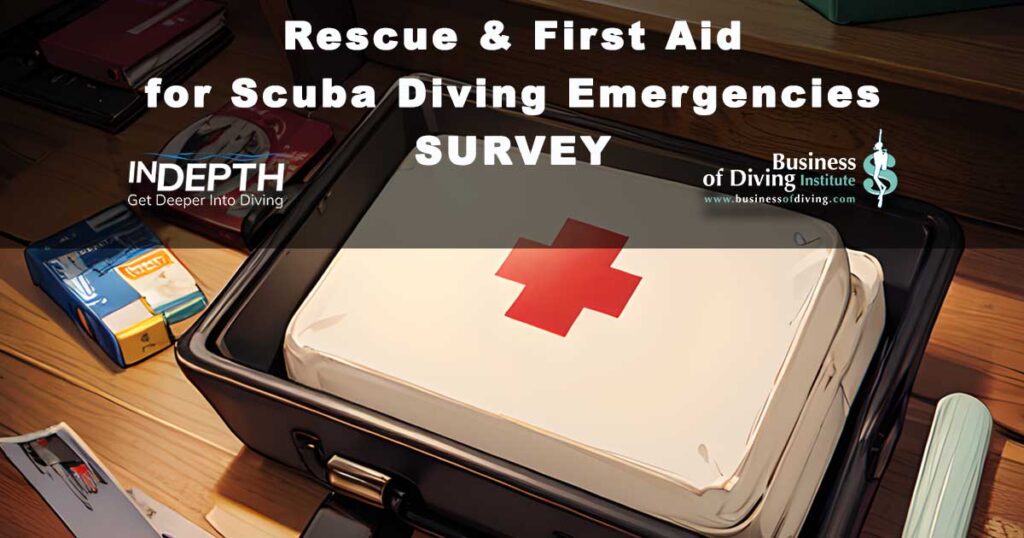Scuba Rescue: Are We Ready? – Survey Results
How prepared are dive professionals and scuba divers to handle scuba diving emergencies? How frequently do they refresh their skills?
How often do you believe dive professionals (divemasters, instructors & instructor trainers) should practice and refresh their scuba rescue skills?
Over the last two months, we conducted an exploratory survey among scuba divers in relation to an article posted on InDEPTH: “How Current Are Your Rescue Skills?”
InDepth Magazine and the Business of Diving Institute collaborate on a series of scuba diving industry surveys to better understand where we stand on dive industry issues, identify workable solutions, increase awareness of opportunities, and, most notably, fuel discussions among dive professionals.
We thank the following scuba diving industry leaders for directly supporting this initiative: Shearwater, DAN Europe, and GUE. We also thank all of you who took part in these surveys and studies.
This post is part of our Dive Industry Compass series by the Business of Diving Institute and Darcy Kieran, author of:
Contents on This Page
TL;DR Overview
This survey highlights significant gaps in rescue and first aid preparedness among scuba diving industry professionals. Many dive professionals, including 36% of recreational and 27% of tech professionals, are not current on essential general first aid and CPR training within the generally accepted two-year refresh cycle. While scuba-specific rescue training is a prerequisite for professional levels, its currency varies, and a concerning number of professionals have never taken an oxygen provider course, despite its critical importance in emergencies. Confidence in the rescue skills of dive operator staff is notably low across the board, although tech professionals tend to rate their own skills higher than recreational professionals. Alarmingly, a high percentage of professionals have either been involved in, witnessed, or performed a dive rescue, suggesting incidents are more common than often officially reported. A major area of concern is tech diving rescue, where more than one in five tech diving professionals have never received specific rescue training, and many lack high confidence in rescuing a fellow tech diver. Despite an overwhelming belief among professionals that tech-specific rescue courses are needed and a high willingness to take them, few training agencies currently offer such vital programs, hindering the industry’s ability to adequately prepare for these complex emergencies.
Detailed Survey Results: Rescue & First Aid for Scuba Diving Emergencies (Recreational & Technical Diving)
There are 3 answers provided for each question.
In order, answers from: all survey respondents / recreational (non-tech) diving professionals / tech diving professionals.
Keep in mind that many tech diving professionals are also recreational dive professionals. These sub-categories are not mutually exclusive.
How long ago did you receive general first aid & CPR training (not specific to scuba diving)?
- Less than a year ago: 34.4% / 43.2% / 31.8%
- 1 year or more but less than 2 years: 19.3% / 6.8% / 31.6%
- 2 years or more but less than 5 years: 15.9% / 13.6% / 9.8%
- 5 years or more but less than 10 years: 6.9% / 6.8% / 7.3%
- 10 years or more: 21.4% / 27.3% / 19.5%
- Never: 2.1% / 2.3% / 0.0%
In other professions and even for the general public, it is generally accepted that first aid and CPR skills should be practiced at least once every 2 years. Therefore, it is concerning to see such a large percentage of dive professionals (36% of recreational & 27% of tech) who haven’t done so.
How long ago did you receive recreational scuba-specific first aid and rescue training, like a Divers Alert Network (DAN) course or a Rescue Diver course?
- Less than a year ago: 28.8% / 26.7% / 37.0%
- 1 year or more but less than 2 years: 15.8% / 15.5% / 21.7%
- 2 years or more but less than 5 years: 19.1% / 26.7% / 6.5%
- 5 years or more but less than 10 years: 13.2% / 6.7% / 17.4%
- 10 years or more: 17.8% / 24.4% / 17.4%
- Never: 5.3% / 0.0% / 0.0%
Since the rescue diver course is a prerequisite for any dive professional level training, it was to be expected that all dive professionals had done scuba-specific rescue training at least once in their lives.
When was the last time you took an oxygen provider course for scuba diving?
- Less than a year ago: 30.3% / 31.1% / 45.7%
- 1 year or more but less than 2 years: 13.2% / 11.1% / 19.6%
- 2 years or more but less than 5 years: 18.4% / 22.3% / 13.0%
- 5 years or more but less than 10 years: 11.2% / 11.0% / 10.9%
- 10 years or more: 7.2% / 15.6% / 4.3%
- Never: 19.7% / 8.9% / 6.5%
Not all dive training agencies offer an oxygen-provider rescue course, and it is typically not a requirement to become a dive professional. But shouldn’t it be? Providing oxygen in a diving incident until reaching paramedics can be critical in most diving incident cases.
How ‘current’ and ‘strong’ would you assess your own diving rescue skills to be on a scale of 1 (very poor) to 5 (excellent)?
- 3.8 / 4.0 / 4.2
Tech diving professionals appear more confident than recreational scuba professionals in their own rescue skills. However, one could argue that a scuba diver under the supervision of a dive professional would expect that leader to be fully (5.0) confident in their rescue skills.
When doing recreational diving (excluding tech diving) with a dive buddy, how generally confident are you that you would be ready to properly deal with an emergency rescue situation affecting your recreational dive buddy, on a scale of 1 (not ready at all) to 5 (totally ready)?
- 4.0 / 4.2 / 4.3
When doing recreational diving (excluding tech diving) with a dive operator (e.g., as a scuba diver on a dive boat), how generally confident are you that the dive professionals supervising the dive are appropriately trained to deal with an emergency rescue situation, on a scale of 1 (not confident at all) to 5 (very confident)?
- 3.0 / 3.2 / 2.7
Scuba divers and dive professionals have low confidence in the rescue skills of dive operators’ staff.
Otherwise, scuba divers and dive professionals have more confidence in their own skills than in those of the dive professionals they encounter at dive operators.
Have you ever been rescued or been involved in a self-rescue?
- Yes: 27.1% / 31.1% / 41.3%
The percentage of scuba divers and dive professionals who have been rescued or involved in a self-rescue is quite high. Overall, we can say that scuba diving is generally safe, based on the number of officially reported accidents. However, based on these results, we can assume that many incidents are not reported.
Have you ever witnessed a diving rescue?
- Yes: 48.7% / 53.3% / 71.7%
Same comment as above. Otherwise, the percentage of dive professionals who have witnessed a diving rescue is scaredly high, especially in tech diving.
Have you ever rescued a diver or participated in a dive rescue?
- Yes: 55.0% / 56.8% / 80.4%
How often do you practice rescue skills?
- At least quarterly: 24.9% / 28.9% / 37.0%
- At least annually: 42.8% / 40.0% / 43.5%
- At least once every 2 years: 9.9% / 8.9% / 15.2%
- At least once every 5 years: 7.2% / 8.8% / 0.2%
- Less often than once every 5 years: 5.3% / 4.4% / 2.0%
- Never: 9.9% / 9.0% / 2.1%
We will revisit this topic with a question below when we asked how often dive professionals “should” practice their rescue skills.
Have you ever practiced bringing an unconscious diver to the surface outside of a formal (certification) rescue diver course?
- Yes, from a depth of up to 10 m (33 ft): 41.4% / 60.0% / 45.7%
- Yes, from a depth of up to 20 m (66 ft): 9.2% / 4.4% / 15.2%
- Yes, from a depth of up to 30 m (100 ft): 3.9% / 2.3% / 8.7%
- Yes, from a depth exceeding 30 m (100 ft): 6.6% / 6.5% / 10.9%
- No: 38.9% / 26.8% / 19.6%
Questions for Tech Diving Professionals Only
30.1% of survey participants were tech diving professionals (divemasters, instructors, or instructor trainers).
How generally confident are you that you would be ready to properly deal with an emergency rescue situation affecting a nearby tech diver, on a scale of 1 (not ready at all) to 5 (totally ready)?
- 1 (not ready at all): 4%
- 2: 7%
- 3: 24%
- 4: 41%
- 5: 24%
35% of tech diving professionals do not feel very confident about their readiness to rescue a tech diver. This should be of concern to tech diving training agencies and dive operators. And it should serve as a warning to tech divers not to necessarily trust that the dive professional supervising them is actually qualified.
This issue may be related to the lack of regular practice of rescue skills as seen in the answers to prior questions.
Questions for Recreational (Non-Tech Diving) Dive Professionals Only
42.1% of survey participants were recreational dive professionals (divemasters, instructors, or instructor trainers).
How generally confident are you that you would be ready to properly deal with an emergency rescue situation affecting a nearby tech diver, on a scale of 1 (not ready at all) to 5 (totally ready)?
- 1 (not ready at all): 5%
- 2: 9%
- 3: 28%
- 4: 41%
- 5: 17%
It is no surprise that recreational dive professionals are less confident than tech diving professionals about rescuing a tech diver, considering it is usually not covered in recreational dive professional training.
Questions for All Dive Professionals (Recreational & Tech)
42.4% of survey respondents were dive professionals for recreational and/or tech diving (divemasters, instructors, or instructor trainers).
How long ago did you teach a recreational scuba-specific first aid or rescue training course (e.g., a Rescue Diver course)?
- Less than a year ago: 48.8% / 42.2% / 55.6%
- 1 year or more but less than 2 years: 11.1% / 11.0% / 11.2%
- 2 years or more but less than 5 years: 6.7% / 8.9% / 4.3%
- 5 years or more but less than 10 years: 5.6% / 4.4% / 6.7%
- 10 years or more: 7.8% / 6.7% / 8.9%
- Never: 20.0% / 26.8% / 13.3%
A dive professional does not have to teach rescue diver courses. Some dive professionals focus their career on a specific type of training that may not include rescue diver courses. However, we asked the question because teaching a rescue diver course is a good way for dive professionals to review their own rescue skills.
How long ago did you specifically teach a DAN (Divers Alert Network) safety or first aid course?
- Less than a year ago: 22.2% / 19.9% / 24.4%
- 1 year or more but less than 2 years: 8.9% / 6.7% / 11.0%
- 2 years or more but less than 5 years: 3.3% / 0.9% / 6.8%
- 5 years or more but less than 10 years: 5.5% / 6.6% / 4.4%
- 10 years or more: 9.7% / 6.7% / 13.3%
- Never: 50.4% / 59.2% / 40.1%
Same observation as for the question above.
How long ago did you receive or teach first aid or rescue training specific to tech diving?
- Less than a year ago: 28.9% / 10.1% / 46.7%
- 1 year or more but less than 2 years: 8.5% / 6.5% / 11.1%
- 2 years or more but less than 5 years: 10.2% / 6.4% / 13.4%
- 5 years or more but less than 10 years: 3.3% / 4.3% / 2.1%
- 10 years or more: 3.4% / 2.2% / 4.4%
- Never: 45.7% / 70.5% / 22.3%
More than one in five tech diving professionals have never received rescue training specific to tech diving. This is stunning!
Do any of the dive training agencies you are associated with offer a rescue course specific to tech diving?
- Yes: 29.9% / 25.0% / 34.8%
The small percentage of dive training agencies offering rescue training specifically tailored to tech diving does not help dive professionals prepare themselves for tech diving emergencies.
Do you believe tech diving training agencies (or other organizations like DAN) should offer rescue courses specific to tech diving emergencies (e.g., for recreational divemasters on dive boats used by tech divers)?
- Yes: 92.3% / 97.8% / 87.0%
A strong majority of scuba divers and dive professionals believe that dive training agencies or organizations like DAN should offer rescue courses specifically tailored to tech diving. So why don’t they? It’s surprising, considering how dive training agencies are usually prompt at offering a wide variety of courses (more or less useful) to maximize their revenues.
Questions for Tech Divers Only
64.7% of survey respondents were tech divers (including tech diving dive professionals).
When doing tech diving with a dive operator (e.g., as a tech diver on a dive boat), how generally confident are you that the dive professionals supervising the dive were appropriately trained to deal with an emergency rescue situation affecting a tech diver on a scale of 1 (not ready at all) to 5 (totally ready)?
- 1 (not ready at all): 12%
- 2: 12%
- 3: 9%
- 4: 29%
- 5 (totally ready): 38%
How generally confident are you that you would be ready to properly deal with an emergency rescue situation affecting a tech diving buddy, on a scale of 1 (not ready at all) to 5 (totally ready)?
- 1 (not ready at all): 4%
- 2: 8%
- 3: 28%
- 4: 42%
- 5: 17%
Questions for Cave Divers Only
47.5% of survey respondents were cave divers (including cave diving dive professionals).
Have you ever practiced bringing an unconscious cave diver to the entrance/surface?
- Yes: 55.6%
Back to Questions for All Scuba Divers
How often do you believe dive professionals (divemasters, instructors & instructor trainers) should practice and refresh their scuba rescue skills?
- At least quarterly: 26.1% / 24.4% / 26.1%
- At least annually: 59.5% / 55.6% / 56.5%
- At least every 2 years: 10.5% / 15.6% / 15.2%
- At least every 5 years or more: 3.9% / 4.4% / 2.2%
Almost all dive professionals (98% of tech diving professionals and 96% of recreational ones) believe dive professionals should practice or refresh their rescue skills at least every 2 years or more frequently.
96% of tech diving professionals have done so. Yet, only 78% of recreational dive professionals have done so, as we saw in a previous question.
On a scale of 1 (very unlikely) to 5 (very likely), how likely would you be to take a tech diving-specific rescue course if one were offered?
- Average score: 4.2 / 4.0 / 4.2
Who participated in our exploratory survey on rescue & first aid skills for scuba diving emergencies?
353 scuba divers answered the survey in full. Only answers from scuba divers who answered the survey in its entirety were counted.
How long ago was their first dive?
- 15% less than 5 years
- 17% from 5 to 10 years
- 68% more than 10 years
Age Group of Survey Respondents
- 1928–1945 (The Silent Generation): 1%
- 1946–1954 (Boomers I): 3%
- 1955–1964 (Boomers II/Generation Jones): 12%
- 1965–1980 (Gen X): 53%
- 1981–1996 (Millennials): 21%
- 1997–2012 (Gen Z): 10%
Region of Residence of Survey Respondents
- USA (incl. AK & HI): 41%
- Western Europe: 33%
- Rest of the World: 26%
Gender of Survey Respondents
- Male: 87%
- Female: 12%
- Non-Binary/Other/Prefer Not To Say: 1%
Video Summary & Thoughts
Have a look at more scuba diving market research, surveys, reports & statistics in Your Dive Industry Compass.
If the information in this post was valuable to you, would you consider buying me a coffee?
Either way, please help the dive industry by taking part in ongoing surveys. Results from our past scuba diving market studies are also available here.
Your Dive Industry Compass
Scuba Diving Market Research, Surveys, Reports & Statistics
Shifting Tides
Strategies for Today’s Scuba Divers
Living The Scuba Dream
Plan Your Scuba Instructor Career & Deep Dive the Plan
You may also be interested in The Immersion Zone (our podcast), Scubanomics (our newsletter for dive professionals), and our published books & reference guides.





